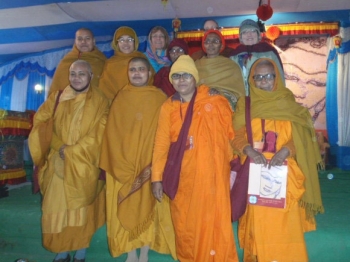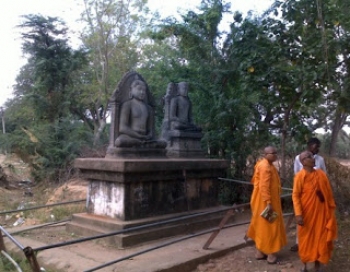Willow Myers works full time as a child and family psychotherapist in a non-profit agency in Bellingham WA. She writes freelance in her spare time. She is currently enjoying writing about the Dharma.
When I met Venerable Suniti, the first things I noticed were her eyes, her bright, bright eyes. These eyes are brilliantly dark orbs framed in rectangular black glasses perched on her nose. Her look quickly breaks my stereotype of a demure nun. With a look that is congruent with her personality, she proves to be a real dynamo.
We conducted the interview on the twin bed of my tiny dorm room, at the Mahaprajapati Temple in Vashali, India, where we were both attending the Sakyadhita Buddhist Women’s Conference. She had two endearing young adolescent girls with her. They watched her every move with obvious adoration.
As we chatted, I learned that Venerable Suniti currently lives and works in Nagpur City in the state of Maharashtra, India. She has a postgraduate degree: “An LLM Science Graduate degree,” per her description. She reportedly studied at the University of Ncagbur and Mumbai Universities. She worked as a social worker and lawyer for 25 years before “taking the Buddhist robes”, she states.
“You were a lawyer and social work both! What motivated you to take the robes?” I ask.
Venerable Suniti replies, “The whole world is full of gender inequality. I was tired of working in a male dominated area. I wanted to promote gender equality for women through the Buddha.”
She adds, “In India, women lawyers are not respected like men. Nuns are respected more than lawyers. Having this respect opened doors to allow me to do better work for women.” The desire to teach Buddhism played a crucial role in her decision to become a woman of the cloth: “Buddhism is important to me – I was raised as a Buddhist. Buddhism is the only religion where women can be equal. It’s the only religion where I can be free as a woman. My parents were converts of Dr. Babasaheb B.R. Ambedkar, who turned 500,000 people to Buddhism. He was also the architect of the Indian constitution. He didn’t believe in the caste system. If it wasn’t for him I wouldn’t be a nun now.”
Venerable Suniti continues on, providing descriptions of her work. I am impressed at the seamless integration of her previous careers into that as a nun. Her list of accomplishments is long, yet I have the sense she is only getting started:
When I met Venerable Suniti, the first things I noticed were her eyes, her bright, bright eyes. These eyes are brilliantly dark orbs framed in rectangular black glasses perched on her nose. Her look quickly breaks my stereotype of a demure nun. With a look that is congruent with her personality, she proves to be a real dynamo.
We conducted the interview on the twin bed of my tiny dorm room, at the Mahaprajapati Temple in Vashali, India, where we were both attending the Sakyadhita Buddhist Women’s Conference. She had two endearing young adolescent girls with her. They watched her every move with obvious adoration.
As we chatted, I learned that Venerable Suniti currently lives and works in Nagpur City in the state of Maharashtra, India. She has a postgraduate degree: “An LLM Science Graduate degree,” per her description. She reportedly studied at the University of Ncagbur and Mumbai Universities. She worked as a social worker and lawyer for 25 years before “taking the Buddhist robes”, she states.
“You were a lawyer and social work both! What motivated you to take the robes?” I ask.
Venerable Suniti replies, “The whole world is full of gender inequality. I was tired of working in a male dominated area. I wanted to promote gender equality for women through the Buddha.”
She adds, “In India, women lawyers are not respected like men. Nuns are respected more than lawyers. Having this respect opened doors to allow me to do better work for women.” The desire to teach Buddhism played a crucial role in her decision to become a woman of the cloth: “Buddhism is important to me – I was raised as a Buddhist. Buddhism is the only religion where women can be equal. It’s the only religion where I can be free as a woman. My parents were converts of Dr. Babasaheb B.R. Ambedkar, who turned 500,000 people to Buddhism. He was also the architect of the Indian constitution. He didn’t believe in the caste system. If it wasn’t for him I wouldn’t be a nun now.”
Venerable Suniti continues on, providing descriptions of her work. I am impressed at the seamless integration of her previous careers into that as a nun. Her list of accomplishments is long, yet I have the sense she is only getting started:
“I work for women’s legal rights – such as dealing with domestic violence, protection from physical and sexual abuse/assault, child rights for the same, protection from child labor and the prevention of human trafficking. I mostly work with the (so-called) untouchables. I go to them in the villages or they come to me at the temple. I also help to educate people. I go to the schools and talk to youth. I go to the colleges – to the state facilities. I talk about the importance of education for the untouchables. I work with parents too. There is a generation gap between the youth I see and the older generation. The older generation is not educated, the younger generation is educated. The older generation doesn’t believe in the youth, they don’t understand them. They want them to stay like them, to follow tradition. They want the girls to marry young and the boys to stay and take care of them. The parents will try and stop the education for the girls. I try to help the parents understand about the importance of education for their children – especially the girls. This gives them choices. They really do want the best for the children. I try to help the children and the parents communicate.”
I wonder whether it is difficult to see the suffering of the people she works with. She replies, “I see the suffering, but it doesn’t bother me. The work makes me happy. I see the smiles on people’s faces when I help them.” I get lots of help; the youth especially like to help [Smiles and nods are exchanged between she and the girls]. The work is satisfying, but it is difficult to do this kind of work without finances.”
I learn that since there is no system supporting the livelihoods of Bhikkhunis in India, nuns get their livelihood from “any available means”. A few Bhikkhunis are given financial support by their families, but this is rare. According to Venerable Suniti: One place in particular, Maharashtra, will give dana to Bhikkhunis for Dharma teachings, but only within certain Buddhist families, which are small in number. Bhikkhunis might also earn a few rupees for helping with family functions. Venerable Suniti describes going from place to place, village to village any way she can get there, for which she will ask “traveling charges.” She states that if she has to go a long way she will ask for tickets.
Later, in a private e-mail, when her students were not present, Venerable Suniti told me: “I suffer when I work with the students as they do not work and cannot support me financially.” But, she adds that she has future plans to support Bhikkhunis financially (for their traveling and medical expenses) by forming an organization. According to Venerable Suniti the youth have made commitments toward giving back someday when they are employed. However, these youth are still students so this is not a viable reality at the present time.
Venerable Suniti also reports that she does Dhammayatras (long walks normally considered a pilgrimage – a walk with a mission) in different districts in India where she has discussions with women, students, organizational people and laborers. When she does this it is fairly easy to stay in people’s houses as she moves from place to place. But she is also gaining a following of Bhikkhunis who want to stay together when they return from the journeys. She reports that the Buddhist Vihars, (temples), which are controlled by the Upasaka/Upasikas, (8 precept male/female lay devotees) have limited space for the Bhikkhunis. It’s also difficult to find enough food for everyone when they are trying to live together. They go on Carikas (alms rounds) but this is not enough. Venerable Suniti wants something more substantial for her growing group.
Although funding is a challenging issue, Venerable Suniti appears undaunted. She has plans to open a Bhikkhuni training center in Nagpur to train her followers. The women will attend for two years to be educated as a Buddhist Anagarika (white robes), or 4 years to be ordained as a Samaneri. Her plans for future fund raising have impressed a Upasika named Vishranti Jambulkar who has donated a 1,000 square foot piece of land for the Bhikkhunis. With this in mind, she recently appealed to a Buddhist group for funding but, as of this interview, she hasn’t heard back. The pieces are coming, but not together yet. But Venerable Suniti has faith that with enough help and funding, she will be able to fulfill her calling.
Access the original Awakening Women version of the article here.
Ven. Suniti can be contacted at bhantesuniti@gmail.com.
Ven. Suniti can be contacted at bhantesuniti@gmail.com.

















